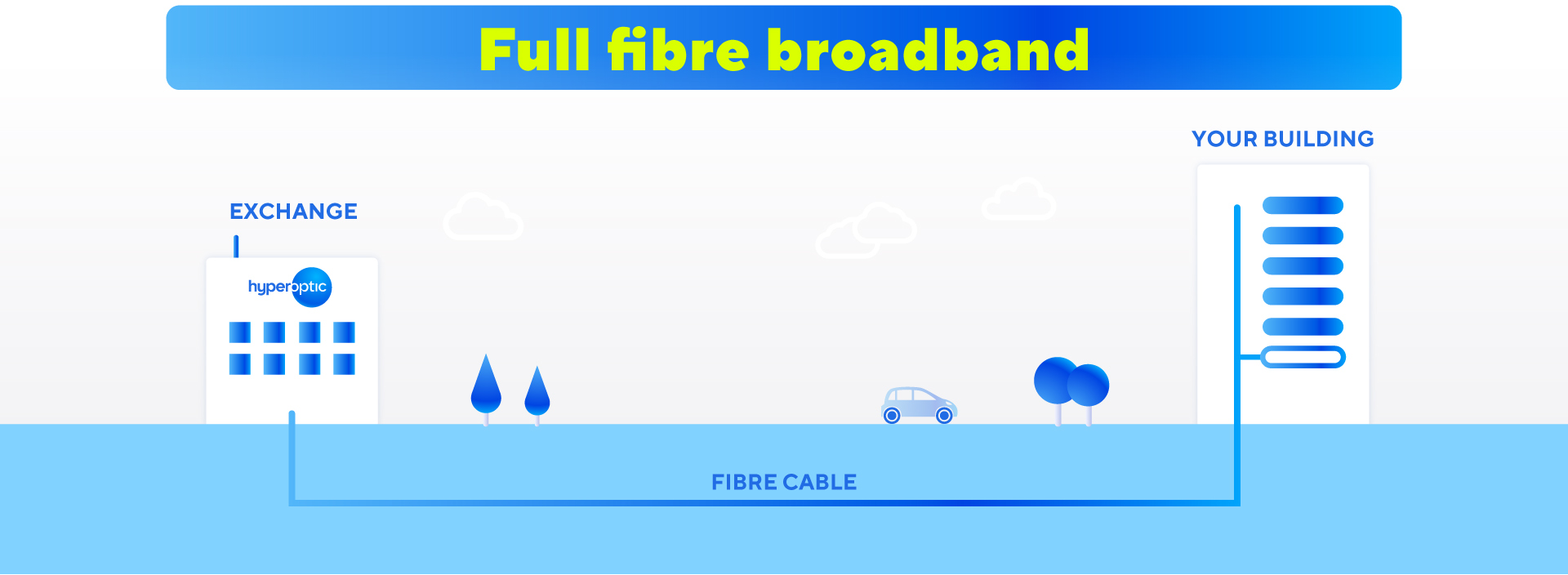What Is Broadband Speed? |

Your broadband speed is essentially a measurement of how quickly your internet connection can upload and download data. This speed will differ between providers and also depends on which type of broadband connection you can access.
When you get to grips with the complexities of broadband speed, you’ll better understand which broadband provider is right for you. This will also allow you to optimise broadband speed by helping you determine the exact number of services and devices your internet can handle.
In this guide, you’ll find out how broadband speeds are measured and gain an in-depth understanding of how and why they can vary.
How Do Broadband Speeds Work?
Broadband speeds can vary depending on your Internet Service Provider (ISP). The internet, and by extension your broadband, is typically connected to your home using a telephone line.
There are two main types of cable that form this connection – fibre optic and copper. A fibre optic cable is made from strands of very thin glass. Instead of electrical currents, it transmits pulses of light, which allow for much faster speeds.
If you have Fibre to the Cabinet (FTTC) broadband, a fibre optic cable connects from the telephone exchange to a street cabinet near your home. A copper cable then connects your house to the street cabinet. The further away your home is, the slower your broadband because it requires the use of more copper cable.
Some parts of the UK have access to Fibre to the Home (FTTH) and Fibre to the Premises (FTTP) broadband, where they can use their broadband without a phone line, also known as Full Fibre. FTTH and FTTP are the same thing, but the one you install will depend on if you are using it for business vs home broadband.
This broadband gives you a dedicated fibre optic connection, installed directly into your house. This means a street cabinet isn’t needed, so you will see much faster speeds.

What Is Sync Speed?
Sync speed represents the speed of data passing between your router or modem and the local telephone exchange. It may vary depending on the copper cable’s length and quality, if you have a copper cable.
It is not a fixed speed. You can usually find your sync rate with an online internet speed checker.
What Is Throughput Speed?
Sync speed tells you how fast the internet can get to your home. Throughput speed tells you how fast your broadband can download and upload data between your router and the internet. This means it cannot be higher than your sync speed and can be affected if there’s a fault on the line.
It can also be influenced by the time of day, causing it to be slower during times of busy internet usage. This is because there is a kind of internet “rush hour” around 8-10pm when everyone attempts to use the shared network at the same time.
What is a good broadband speed?
A good broadband speed is a broadband speed that allows you to get online and do the things you love – with minimal lag and maximum bandwidth!
The speed you need will depend on what you use your connection for. As a gigabit broadband provider, we believe the faster, the better! But we would recommend a download speed of at least 150Mbps (although we do offer a 50mb full fibre broadband package for those who want something a bit less fast-paced).
How Are Broadband Speeds Measured?
Test your internet speed now
The speed of broadband is measured in megabits per second. The more megabits there are, the faster the connection speed.
The maximum rate at which data can be received is known as the downstream bandwidth (download speed). The maximum rate data can be sent is called the upstream bandwidth (upload speed). This is also known as “Upload vs Download speed”.
These bandwidth speeds determine how quickly you can stream video and music, download and play games online, and use video calling software. Because most of the activities you’ll be doing on the internet involve the need to download data, ISPs typically offer faster download speeds than upload speeds.
Why Do Broadband Speeds Differ?
Broadband speeds differ for several reasons. Certain times of the day, known as rush hours or peak times, are much slower than off-peak times because more people around the country are connecting to the internet all at once.
This is also sometimes caused by the ISPs themselves, and is known as “Traffic Management”. Fortunately, not every ISP restricts online traffic flow.
You will also notice a difference in speed depending on whether your fibre optic broadband is Full Fibre or FTTC. The former will be much faster because fibre optic cables connect directly to your house.
FTTC will be slower because it has to go through a service cabinet. The length of the line from your home to the cabinet will also play a factor.
What Is the Average Broadband Speed in the UK?
According to Ofcom telecommunications regulator, as of 2022, the median average broadband download speed in the UK is 59.4Mbps – up 9Mbps from 2021’s figure of 50.4Mbps. Speed has increased rapidly in the last 5 years since 2017 when the average speed was 36Mbps. Since 2019, broadband speed has improved by over 9Mbps every year.
It is important to note when looking at this trend, that Full Fibre offered the fastest speeds. More than 90% of UK households now have access to a superfast broadband package.
Approximately 8% of homes have access to ultrafast packages, which is useful to know if you intend to move broadband when you move house.
Which Hyperoptic Broadband Deal Is for Me?
Now that we’ve answered “what is broadband speed”, it’s time to compare full fibre broadband deals. Hyperoptic offers a wide range of broadband packages with speeds ranging from 50Mbps to 1000Mbps.
What is the right broadband speed for me?
To understand what broadband speed you need, it’s important to consider what kind of broadband user you are (and how many of you will be using the connection).
A light user: If you only use the internet for everyday tasks (for example, checking emails) and there are 1-2 of you using the connection, a 50Mb package will suit you.
A medium user: If you often use the internet for browsing the web, social media and streaming TV and there are 2-3 of you using the connection, a 150Mb or 500Mb package may be best for you.
A heavy user: If you use the internet a lot, for gaming, homeworking, downloading and sharing files, video chatting (I.e. activities that use plenty of bandwidth) or you live in a busy household with lots of gadgets, you’ll likely need a 500Mb or 1Gb package.
Pros and Considerations of Different Speed plans
50Mb
| Pros: | Considerations: |
|---|---|
| Average download speed of 57Mbps | Upload speed slower than download speed |
| Perfect for smaller households | Larger households may see interruptions |
| Capable of HD streaming |
150Mb
| Pros: | Considerations: |
|---|---|
| Identical download speed and upload speed | Large households may see interruptions when streaming simultaneously |
| Capable of 4K streaming | It may be too much for smaller households |
| Supports a household of 4-6 people |
1Gb
| Pros: | Considerations: |
|---|---|
| Fastest broadband on offer | It may be unnecessary for smaller households |
| Identical upload and download speeds | Not available everywhere |
| Perfect for those that frequently download, run public web servers, or stream using Twitch |
Check out our price plans, to see which of our competitive deals are right for you, then switch over and gain access to ultra-fast broadband.
If you can find a cheaper deal elsewhere, we’ll match it. Discover why hyper-fast does not have to mean hyper-expensive.
Check out our full fibre broadband packages |

Most popular FAQs
What is a good speed on broadband?
If you are living alone, or are the only broadband user in your home, you can get away with a download speed of 25Mbps. However, it’s unlikely you’ll be able to use HD streaming or maintain a reliable online gaming connection. 50Mbps is the minimum we recommend if you have multiple users in your house. When it comes to HD streaming, the higher the download speed, the better.
Is 67 Mbps good broadband speed?
A 67Mbps broadband speed falls under the superfast category. This means it will be more than enough for homes with only a few active internet users. If you intend to stream in 4K, you may want to purchase a higher-speed deal.
Is 100 Mbps fast for broadband?
Compared to the average UK speed, 100Mbps is a fast broadband speed. However, compared to gigabit broadband, it is on the lower end. As a rule of thumb, 100Mbps should be able to handle 4K streaming, for up to four people at once.
Minimum broadband speed
If you simply wish to browse social media and answer a few emails, 10Mbps is the absolute minimum. If you want to do any other activity online, you will need a faster broadband speed.
Is broadband speed the same as wifi speed?
Wifi speed and broadband speed are not the same, but your wifi speed can only ever be as good as your broadband speed. Your wifi is the wireless network connection that connects devices to your router, while your broadband is the connection to the internet itself. This means your wifi speed simply measures how fast a device can connect to the router, not to the actual internet.
Is 50 Mbps fast enough for Netflix?
50Mbps is usually fast enough for Netflix, but if there are multiple people in your home attempting to use it at once, there may be interruptions. You will likely not have access to HD or 4K streaming if there are multiple users.





